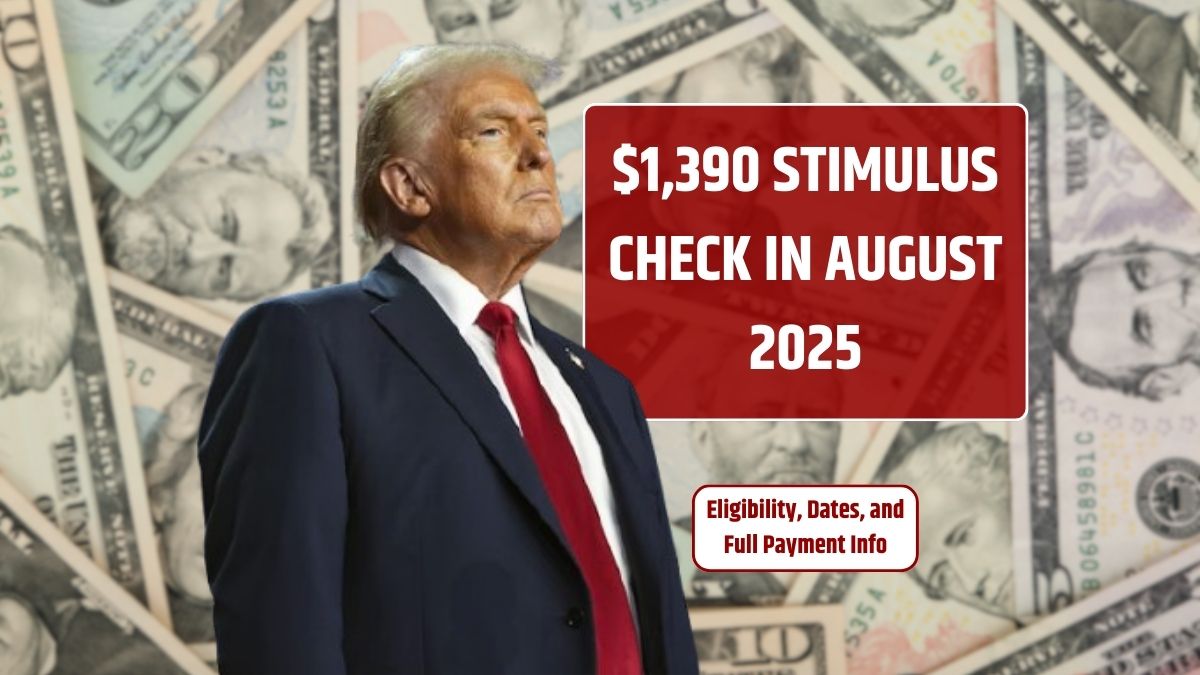With inflation still impacting household budgets in 2025, the U.S. government is rolling out a one-time $1,390 stimulus check for eligible Americans. This relief aims to help low and middle-income families manage everyday costs like rent, groceries, and utility bills.
If you’ve seen this amount mentioned on social media or news outlets, you’re probably wondering who qualifies and when the money is coming. Let’s break it all down.
Stimulus
The $1,390 stimulus check is part of a federal economic aid plan for August 2025. It’s a one-time payment designed to assist families struggling with rising living expenses. The payment is expected to benefit those already receiving federal aid (like SSI, SSDI, and Social Security) and those who meet certain income criteria.
You don’t need to apply separately. If you’ve filed your taxes or receive government benefits, you’re likely already in the system.
Eligibility
To receive the $1,390 check, you must meet one of the following requirements:
- Single filers earning up to $75,000 annually
- Married couples filing jointly earning up to $150,000
- Heads of household earning up to $112,500
- SSI, SSDI, VA, Railroad Retirement beneficiaries
- Families with dependents may receive additional amounts
Higher earners may get reduced payments, and anyone above the income cutoff may not be eligible.
Benefits
Worried that the stimulus will reduce your current benefits? Don’t be. This payment does not affect your regular Social Security, SSI, SSDI, or VA payments. It is a separate relief fund, and it doesn’t reduce your monthly checks.
That means you’ll continue to receive your usual benefits, and this $1,390 is added support.
Payment
Though no exact date has been confirmed, the IRS is expected to start sending payments by mid to late August 2025, using a phased schedule like previous stimulus rounds.
| Payment Method | Description |
|---|---|
| Direct Deposit | Sent first to those with bank info on file |
| Paper Check | Mailed to home addresses if no bank info exists |
| EIP Debit Card | Sent to select recipients without bank access |
To avoid delays, make sure your bank and mailing details are up to date with the IRS or SSA.
Tools
The IRS is expected to relaunch tools like:
- “Get My Payment” – to track the status of your stimulus
- “Check Eligibility” – to confirm if you qualify
Both tools will be available at irs.gov and will require basic personal details like your Social Security number and date of birth.
Taxes
Good news: this payment is not taxable. You won’t need to report it as income on your next return. It won’t affect your eligibility for programs like:
- Medicaid
- SNAP (food stamps)
- Housing assistance
It’s treated just like the previous stimulus checks from 2020 and 2021—no strings attached.
Use
There’s no restriction on how to use your stimulus check, but here are smart ways to put it to use:
- Catch up on rent or mortgage
- Pay utility bills like gas, electric, or water
- Buy groceries or medical supplies
- Cover credit card or loan payments
- Build a small emergency fund
It’s all about easing financial pressure—so use it where it helps most.
Bonus
Some Americans may also be eligible for an additional $1,702 stimulus, depending on income, dependents, or local aid programs. Check with IRS or state websites for eligibility on overlapping relief payments.
Stay Updated
To make sure you don’t miss anything:
- Bookmark irs.gov
- Sign up for IRS email alerts
- Check your SSA/SSI/SSDI portal regularly
- Keep your personal info current
These steps ensure you’ll get your payment quickly and without hassle.
The $1,390 stimulus check is a major help for many households trying to stay afloat in a tough economy. Whether you’re retired, disabled, working class, or caring for dependents, this check is aimed at making life a little easier this August. Make sure your details are in order, and stay alert for official IRS announcements to avoid missing out.
FAQs
Is the $1,390 stimulus payment confirmed?
Yes, it’s part of a federal relief plan expected in August 2025.
Will this affect my Social Security benefits?
No, the stimulus does not reduce your monthly Social Security checks.
How will I receive the payment?
Via direct deposit, paper check, or EIP debit card.
Do I need to apply for the stimulus check?
No, if you’re eligible, it will be sent automatically.
Where can I track my stimulus status?
Use the IRS Get My Payment tool on irs.gov when it’s available.




